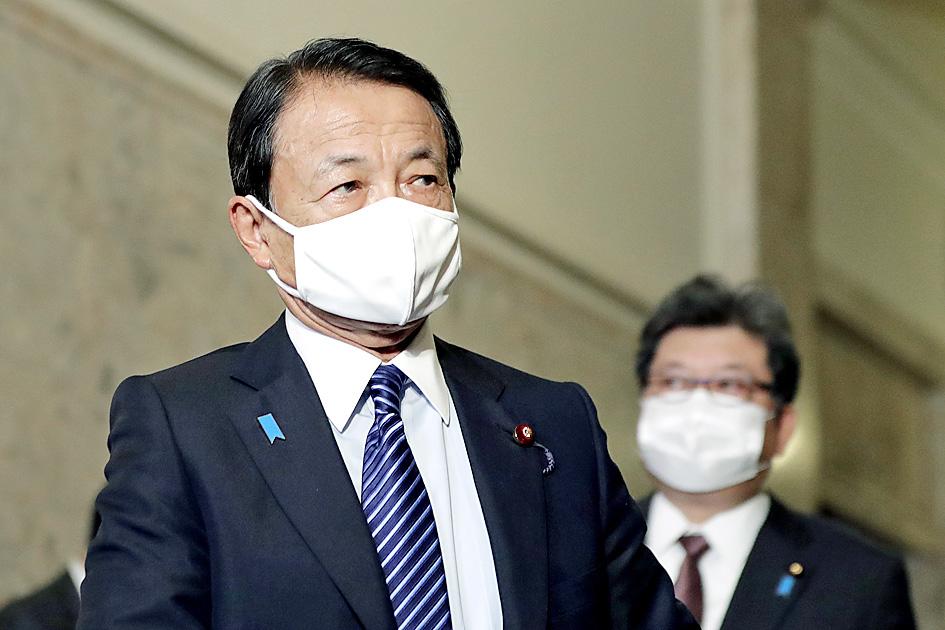Japan should consider setting up a special economic zone for global banking businesses now that Hong Kong is losing its appeal as a financial hub amid China’s crackdown, Japanese Minister of Finance Taro Aso said yesterday.
Hong Kong’s ability to function as an international finance hub is being eroded, Aso told reporters in Tokyo.
“We need to think about a lot of things, including setting up something like a special zone” for the industry, Aso said.

Photo: Bloomberg
His comments came after Japanese Prime Minister Yoshihide Suga on Monday said that he wants to build an international financial center in the country.
If Japan is going to win more business in global finance, it needs to encourage more use of English, end the tradition of requiring documents to be physically stamped, and adjust various rules for foreign workers, Aso said.
“Doing this will of course help revitalize the Japanese market. We’ve received orders to take action with a sense of speed,” he said.
Past efforts to create special economic zones to boost growth were not focused enough, but the idea could work now with Hong Kong losing its attractiveness, SMBC Nikko Securities Inc economist Koya Miyamae said.
“The situation in Hong Kong isn’t going back to the way it was,” he said, adding that Japan would still need to offer measures such as tax breaks to lure businesses away.

South Korea’s equity benchmark yesterday crossed a new milestone just a month after surpassing the once-unthinkable 5,000 mark as surging global memory demand powers the country’s biggest chipmakers. The KOSPI advanced as much as 2.6 percent to a record 6,123, with Samsung Electronics Co and SK Hynix Inc each gaining more than 2 percent. With the benchmark now up 45 percent this year, South Korea’s stock market capitalization has also moved past France’s, following last month’s overtaking of Germany’s. Long overlooked by foreign funds, despite being undervalued, South Korean stocks have now emerged as clear winners in the global market. The so-called “artificial intelligence

NEW IDENTITY: Known for its software, India has expanded into hardware, with its semiconductor industry growing from US$38bn in 2023 to US$45bn to US$50bn India on Saturday inaugurated its first semiconductor assembly and test facility, a milestone in the government’s push to reduce dependence on foreign chipmakers and stake a claim in a sector dominated by China. Indian Prime Minister Narendra Modi opened US firm Micron Technology Inc’s semiconductor assembly, test and packaging unit in his home state of Gujarat, hailing the “dawn of a new era” for India’s technology ambitions. “When young Indians look back in the future, they will see this decade as the turning point in our tech future,” Modi told the event, which was broadcast on his YouTube channel. The plant would convert

‘SEISMIC SHIFT’: The researcher forecast there would be about 1.1 billion mobile shipments this year, down from 1.26 billion the prior year and erasing years of gains The global smartphone market is expected to contract 12.9 percent this year due to the unprecedented memorychip shortage, marking “a crisis like no other,” researcher International Data Corp (IDC) said. The new forecast, a dramatic revision down from earlier estimates, gives the latest accounting of the ongoing memory crunch that is affecting every corner of the electronics industry. The demand for advanced memory to power artificial intelligence (AI) tasks has drained global supply until well into next year and jeopardizes the business model of many smartphone makers. IDC forecast about 1.1 billion mobile shipments this year, down from 1.26 billion the prior

People stand in a Pokemon store in Tokyo on Thursday. One of the world highest-grossing franchises is celebrated its 30th anniversary yesterday.